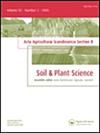Use of Paper-mill Wastes on Agricultural Soils: Is This a Way to Reduce Nitrate Leaching?
IF 1.8
4区 农林科学
Q2 AGRONOMY
Acta Agriculturae Scandinavica Section B-Soil and Plant Science
Pub Date : 2003-01-01
DOI:10.1080/09064710310003925
引用次数: 9
Abstract
The term paper-mill waste is used for different products: de-inked fiber sludge, primary fiber sludge, secondary sludge and mixtures. The aim of this study was to find out if any of these materials can be safely used on agricultural soils to induce net N immobilization of N, and thereby decrease nitrate (NO 3 ) leaching. Chemical characterization showed that secondary sludge derived from biological waste water treatment was a nutrient-rich material low in fiber content, whereas primary and de-inked fiber sludge were high in fiber content and low in nutrient content. Cellulose-C and hemi-cellulose-C amounted to 46% and 36% of the organic C present, respectively, and C/N ratios were around 130 in primary and de-inked fiber sludge. Incubation studies at 8°C over 2 months showed that the decomposability of primary and de-inked fiber sludge in soil was not significantly different. Both showed lower decomposability than secondary sludge. Concentrations of inorganic N in soil declined to very low levels after application of primary and deinked fiber sludge and their capacity for net N immobilization was 4.8-7.2 kg N t - 1 C added at 5°C. However, contents of Cu, Cd and polycyclic aromatic hydrocarbons in de-inked fiber sludge limit its use on arable land. Only primary fiber sludge was found to be suitable as a introgen catch fiber material for use on agricultural soils.在农业土壤上使用造纸厂废料:这是减少硝酸盐浸出的一种方法吗?
造纸厂废物一词用于不同的产品:脱墨纤维污泥、原纤维污泥、二次污泥和混合物。本研究的目的是找出是否有任何这些材料可以安全地用于农业土壤,以诱导N的净氮固定,从而减少硝态氮(no3)的淋失。化学表征表明,生物废水处理产生的二次污泥是一种营养丰富、纤维含量低的物质,而原浆和脱墨纤维污泥则是纤维含量高、营养含量低的物质。纤维素-C和半纤维素-C分别占有机碳的46%和36%,原生和脱墨纤维污泥的碳氮比约为130。在8°C条件下2个月的培养研究表明,原生纤维污泥和脱墨纤维污泥在土壤中的分解能力没有显著差异。两者的分解能力均低于二次污泥。施用原生纤维污泥和脱墨纤维污泥后,土壤中无机氮的浓度下降到非常低的水平,在5°C下,它们的净氮固定能力为4.8-7.2 kg N / t - 1 C。但脱墨纤维污泥中Cu、Cd和多环芳烃的含量限制了其在耕地上的利用。发现只有原纤维污泥适合作为农业土壤的氮素捕获纤维材料。
本文章由计算机程序翻译,如有差异,请以英文原文为准。
求助全文
约1分钟内获得全文
求助全文
来源期刊
CiteScore
4.40
自引率
0.00%
发文量
56
审稿时长
2.3 months
期刊介绍:
Acta Agriculturæ Scandinavica Section B publishes original research in applied soil and plant science with special attention given to to crop production in agri- and horticultural systems. We welcome manuscripts dealing with:
Climate smart and sustainable crop production systems
Water and nutrient efficiency
Soil conservation and productivity
Precise agriculture systems
Applications of bio- and nanotechnology
Digitalisation and robotics
Soil-plant interactions
Acta Agriculturæ Scandinavica, Section B – Soil & Plant Science forms part of a series of titles published on behalf of the Nordic Association of Agricultural Science (NJF). The series also includes Section A - Animal Science .

 求助内容:
求助内容: 应助结果提醒方式:
应助结果提醒方式:


